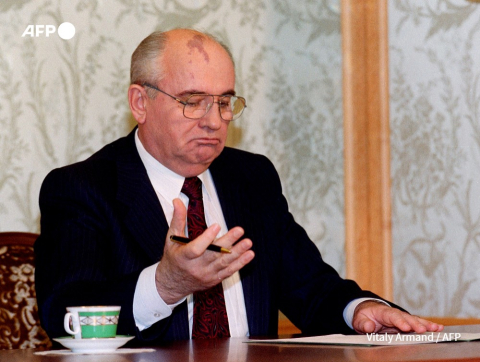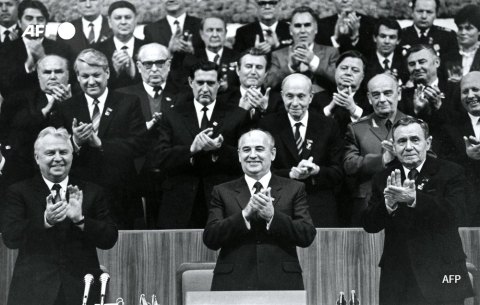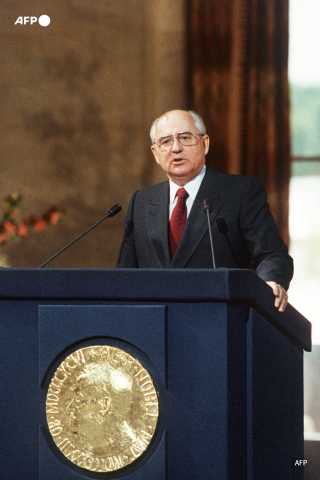Gorbachev: Toppled by his own reforms

On Christmas Day 1991 the last Soviet leader Mikhail Gorbachev resigned after changing the course of modern history by triggering the demise of the USSR and allowing Eastern Europe to free itself from Soviet rule.
On the eve of the announcement AFP correspondent Paola Messana wrote this profile of the man whose achievements earned him accolades in the West but the scorn of many Russians.
MOSCOW, December 24, 1991 (AFP) - Mikhail Gorbachev, who is expected to resign as president of the Soviet Union by Wednesday evening, was toppled by the forces he unleashed.
By championing reforms to achieve "perestroika" (restructuring), Gorbachev inadvertently unleashed forces that led to the dissolution of the Soviet Union and his own ousting.
His departure takes place alongside the final demise of the Soviet empire, which was sealed at Minsk, Belarus, on December 8 when three Slavic Soviet republics created a new Commonwealth of Independent States (CIS).
The move was endorsed last weekend at Almaty by the leaders of 11 former Soviet republics.
As the Soviet Union vanished in international law, so did Gorbachev's position.
Aged 60, and after six years and nine months of perestroika, Gorbachev was a casualty of the developments he himself initiated, and whose consequences he had not predicted.
A politician trained within the bosom of the Soviet Union's Communist Party, Gorbachev reluctantly stepped down after being betrayed by his former comrades during the failed August 1991 coup.

When he came to power in 1985, Gorbachev envisioned perestroïka as a way of reforming the Soviet system to give the socialist superpower a new lease of life. At the time it was struggling economically, bogged down in Afghanistan and incapable of going any further in the frenetic arms race.
He had not counted on the upheavals that would spiral during his seven years in power. But he certainly demonstrated wisdom in doing all in his power to accept the inevitable and to avoid a bloodbath.
But all that came at the cost of procrastination which although it saved the country from civil war on several occasions, made him a sworn enemy for many Russians.
A place in history -
Apart from errors in drawing up and implementing his economic reforms, Gorbachev's failure is largely down to the shortcomings of his domestic policy.
Hundreds of thousands of Russian, Armenian, Azeri and Turkish refugees could not forgive Moscow's abandoning of Armenians to their fate at Soumgait, Azerbaijan in 1988. Nor that it unleashed its special forces on a handful of demonstrators in Tbilisi, Georgia in 1989. Nor that it sent tanks to Baku, Azerbaijan in 1990 and Vilnius, Lithuania in 1991.
And in each case it acted belatedly, undermining the presidential power.
His term in power however saw the victory of democratic forces and economic liberalism, and the upsurge of nationalism.

Finally, after the failure of a coup by reactionaries, came independence for the Baltic states and the splintering of the Soviet Union into a multitude of states.
The ambitious Russian President Boris Yeltsin was able to benefit from Gorbachev's mistakes.
Nobel Peace Prize laureate in 1990, Gorbachev, nevertheless has his place in history. Known as the father of "new thinking", he remains the mastermind of disarmament, of the liberation of Eastern Europe and of German reunification.
Extremely popular overseas, Gorbachev -- and his wife Raisa - have become over the past few years highly unpopular in his own country, even if his each and every speech generated interest around the world.
The failed August coup, in speeding up the process of dismantling the old regime, was a death blow to him.
Having saved him, Yeltsin in the space of three months took over all the federal powers and prerogatives.
Gorbachev was then forced to watch as the Communist Party was banned and dismantled.
He then went from defeat to humiliation. Forced to give up his post as General Secretary of the Communist Party, he had to stand by as the communists fell apart.
He then had to recognise the independence of the Baltic states and look on as the union treaty he spearheaded, aimed at continuing a unified state, failed.
After hanging on for a few more days, he eventually had to go.
